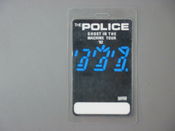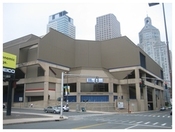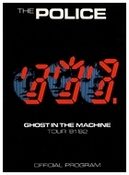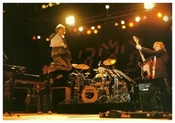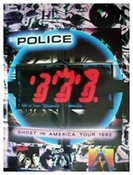
The Police put on arresting show...
There's a symmetry to the Police that reduces their music to the most essential elements.
Under a triangle of brilliant lights, this trio of percussion, bass and melody provided a pyramid of power-pop Saturday night, when the Hartford Civic Centre was sold out to an audience of more than 16,000.
Lead singer and bassist Gordon ''Sting'' Sumner, drummer Stewart Copeland and guitarist Andy Summers presented a tight, bright show, though not as high-powered as when the band played New Haven in January.
The focus of this troika is the engaging Sumner, who supplies most of the band's material and vocals. His melodious, raspy voice is distinctive, especially compared to the current Cuisinart blend of rock vocals. He also has developed a sound signature - yelping out little musical barks - that has become an infectious crowd-pleaser. (Leaving the concert along Asylum Street, one could hear the echoes of fans arfing away into the night.)
Sumner was dressed in a black silk shirt with grand satin swirls and black pin-striped pants. His futuristic, streamlined bass seemed as if it were designed for the Museum of Modern Art music. These bold, stark and photogenic images are not insignificant to a group that dyed their hair blond for a chewing gum commercial when they were first starting out. In an era of faceless bands, the Police have mugs to remember. It is no fluke that the show is one of the best designed concerts in rock, thanks to the smart lighting of Nick Sholem.
The Police have never taken the orthodox career route, and their stage show reaffirms that attitude. Instead of doing a medium hit at the start of the show, and saving the popular heavyweights for the concert's windup, the band instead opened with 'Message in a Bottle', followed by 'Everything She Does Is Magic' and 'Spirits in the Material World'. It was a 1-2-3 punch that had the audience reeling from the start.
The band was not content to reproduce the best numbers off their four albums. Each song's multi-tracked effects were reinterpreted in the space of the arena stage. 'Magic' had a decidedly big, calypso beat to it, and the band traded the album's haunting fade-out for a power-pop finish in concert.
'J'aurais Toujours Faim de Toi' was far more jazzy than the recorded version. And for 'Spirits', a meaner sound was underscored by the tough trumpeting of Marvin Daniels. (For the concert, Police received strong support from Chops, the back-up group of Dave Watson, Daryl Dixon and Daniels.)
Seven of the 16 songs in the nearly hour-and-a-half show were from their latest album, 'Ghost in the Machine', with the rest of the tunes culled from their other discs.
Many of the Police's songs have a political bent to them, but they are not nearly as political as cuts by the Clash. Police songs such as 'One World', 'Invisible Sun', or 'When the World is Running Down', all performed during the concert, contain non-threatening lyrics that are more philosophical than usual for the anarchic punk canon. One suspects that even if the Police wanted to, they would never let their politics get in the way of their craft - especially when it involves the elements to entertain. Some of their songs are so rapturous that sing-alongs, usually gruesome experiences at rock concerts, were irresistible. 'De Do Do Do, De Da Da Da,' or 'Walking on the Moon' were rituals of joy.
The concert ended with an encore of 'Roxanne', the band's first hit, 'Don't Stand So Close to Me' and 'I Can't Stand Losing You'.
The band has made an amalgam of various musical styles, many of which were picked up in their extensive, globe-trotting tours. African rhythms, reggae beats and elements ranging from Eastern to jazz to R&B contribute to the whole - so much so that when a true rock riff appears, it seems just as exotic as their Third World sounds.
Backstage after the show, Copeland, who founded the group in 1976 during Britain's punk rage, remarked on the eclectic ability of the Police. ''At this point (of the band's career), I'm beginning to scratch my head and wonder what it is that we got that has enabled us to carry on. Why didn't anyone else pick up on the influences that we've picked up on? I mean, I find it easy to do what I do. Other musicians work really hard and just don't get there.''
As he spoke, he removed the black tape that he had wrapped around his fingers to prevent his calluses from opening during the show.
Copeland, the only American of the trio, said the success of the Police was not surprising. ''This is everything the band intended to be. But having said that, I have to remind you that any band thinks they are the one who ought to make it, they think they ought to. Musicians, I think, are natural-born optimists. I don't know what it is. I've always assumed, and I think all three of us would agree - one of the few things we would agree on - that we've always assumed that we would make it. But having gotten here, I now wouldn't make that assumption so easily - knowing how many doors had to be kicked down, how many things we had to have, and how many things we had to do.''
Copeland was asked to comment on a quote by Sumner that any band can only produce three really good albums. ''Yes, that quote has been reoccurring ever since we recorded out fourth album. Well, Sumner proved himself wrong. He had never been in a position to record a fourth album before, so looking into the future it would look like a tall order. But we did it. It was hard. But you know, it does give you great faith in yourself when you do it.''
And where do they go from here?
''We've actually been at that point for quite some time now. It's never stopped us.''
(c) The Hartford Courant by Frank Rizzo
There's a symmetry to the Police that reduces their music to the most essential elements.
Under a triangle of brilliant lights, this trio of percussion, bass and melody provided a pyramid of power-pop Saturday night, when the Hartford Civic Centre was sold out to an audience of more than 16,000.
Lead singer and bassist Gordon ''Sting'' Sumner, drummer Stewart Copeland and guitarist Andy Summers presented a tight, bright show, though not as high-powered as when the band played New Haven in January.
The focus of this troika is the engaging Sumner, who supplies most of the band's material and vocals. His melodious, raspy voice is distinctive, especially compared to the current Cuisinart blend of rock vocals. He also has developed a sound signature - yelping out little musical barks - that has become an infectious crowd-pleaser. (Leaving the concert along Asylum Street, one could hear the echoes of fans arfing away into the night.)
Sumner was dressed in a black silk shirt with grand satin swirls and black pin-striped pants. His futuristic, streamlined bass seemed as if it were designed for the Museum of Modern Art music. These bold, stark and photogenic images are not insignificant to a group that dyed their hair blond for a chewing gum commercial when they were first starting out. In an era of faceless bands, the Police have mugs to remember. It is no fluke that the show is one of the best designed concerts in rock, thanks to the smart lighting of Nick Sholem.
The Police have never taken the orthodox career route, and their stage show reaffirms that attitude. Instead of doing a medium hit at the start of the show, and saving the popular heavyweights for the concert's windup, the band instead opened with 'Message in a Bottle', followed by 'Everything She Does Is Magic' and 'Spirits in the Material World'. It was a 1-2-3 punch that had the audience reeling from the start.
The band was not content to reproduce the best numbers off their four albums. Each song's multi-tracked effects were reinterpreted in the space of the arena stage. 'Magic' had a decidedly big, calypso beat to it, and the band traded the album's haunting fade-out for a power-pop finish in concert.
'J'aurais Toujours Faim de Toi' was far more jazzy than the recorded version. And for 'Spirits', a meaner sound was underscored by the tough trumpeting of Marvin Daniels. (For the concert, Police received strong support from Chops, the back-up group of Dave Watson, Daryl Dixon and Daniels.)
Seven of the 16 songs in the nearly hour-and-a-half show were from their latest album, 'Ghost in the Machine', with the rest of the tunes culled from their other discs.
Many of the Police's songs have a political bent to them, but they are not nearly as political as cuts by the Clash. Police songs such as 'One World', 'Invisible Sun', or 'When the World is Running Down', all performed during the concert, contain non-threatening lyrics that are more philosophical than usual for the anarchic punk canon. One suspects that even if the Police wanted to, they would never let their politics get in the way of their craft - especially when it involves the elements to entertain. Some of their songs are so rapturous that sing-alongs, usually gruesome experiences at rock concerts, were irresistible. 'De Do Do Do, De Da Da Da,' or 'Walking on the Moon' were rituals of joy.
The concert ended with an encore of 'Roxanne', the band's first hit, 'Don't Stand So Close to Me' and 'I Can't Stand Losing You'.
The band has made an amalgam of various musical styles, many of which were picked up in their extensive, globe-trotting tours. African rhythms, reggae beats and elements ranging from Eastern to jazz to R&B contribute to the whole - so much so that when a true rock riff appears, it seems just as exotic as their Third World sounds.
Backstage after the show, Copeland, who founded the group in 1976 during Britain's punk rage, remarked on the eclectic ability of the Police. ''At this point (of the band's career), I'm beginning to scratch my head and wonder what it is that we got that has enabled us to carry on. Why didn't anyone else pick up on the influences that we've picked up on? I mean, I find it easy to do what I do. Other musicians work really hard and just don't get there.''
As he spoke, he removed the black tape that he had wrapped around his fingers to prevent his calluses from opening during the show.
Copeland, the only American of the trio, said the success of the Police was not surprising. ''This is everything the band intended to be. But having said that, I have to remind you that any band thinks they are the one who ought to make it, they think they ought to. Musicians, I think, are natural-born optimists. I don't know what it is. I've always assumed, and I think all three of us would agree - one of the few things we would agree on - that we've always assumed that we would make it. But having gotten here, I now wouldn't make that assumption so easily - knowing how many doors had to be kicked down, how many things we had to have, and how many things we had to do.''
Copeland was asked to comment on a quote by Sumner that any band can only produce three really good albums. ''Yes, that quote has been reoccurring ever since we recorded out fourth album. Well, Sumner proved himself wrong. He had never been in a position to record a fourth album before, so looking into the future it would look like a tall order. But we did it. It was hard. But you know, it does give you great faith in yourself when you do it.''
And where do they go from here?
''We've actually been at that point for quite some time now. It's never stopped us.''
(c) The Hartford Courant by Frank Rizzo

